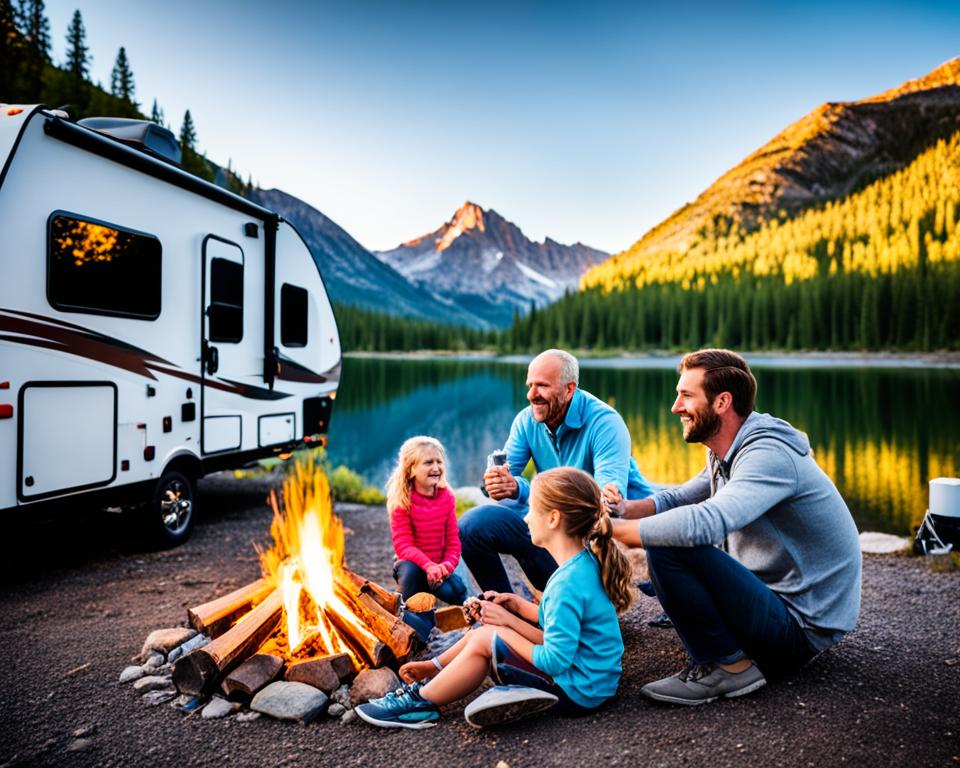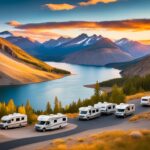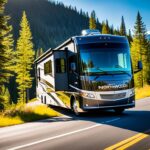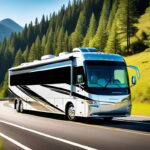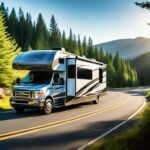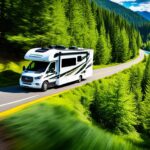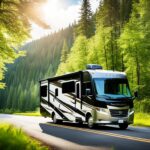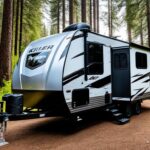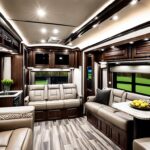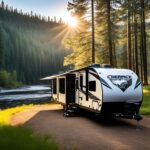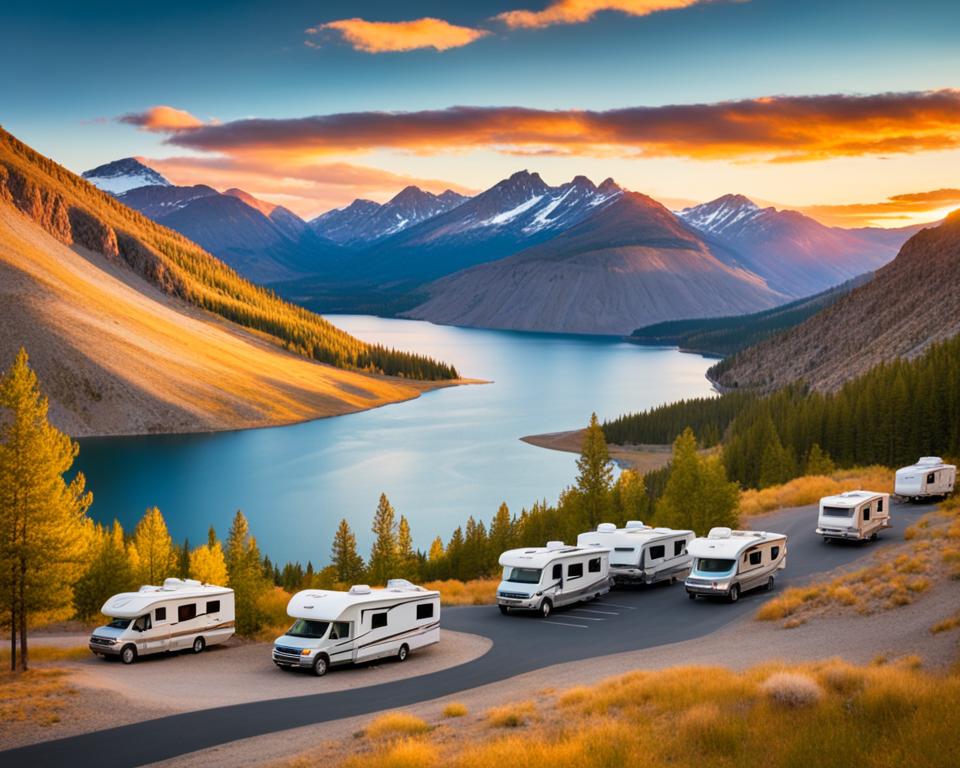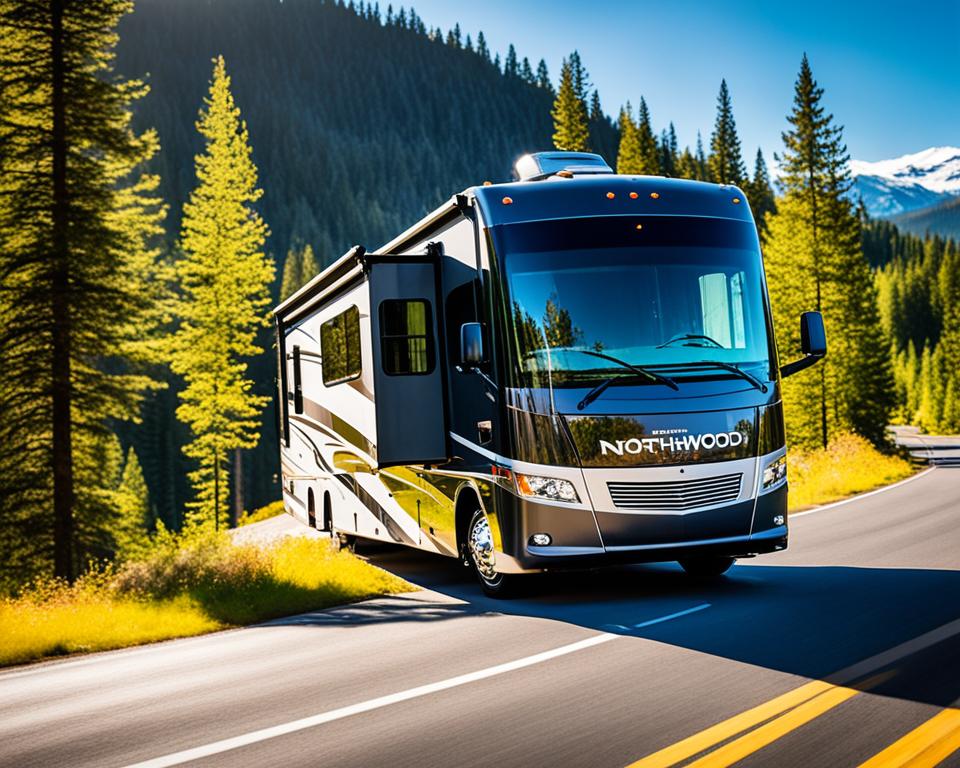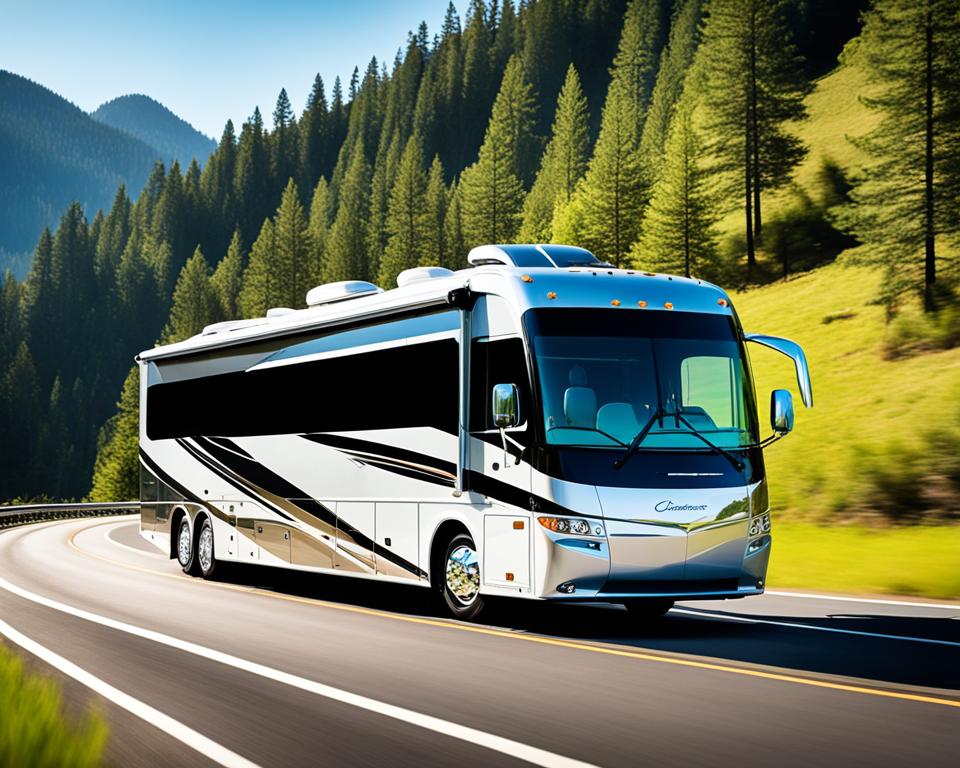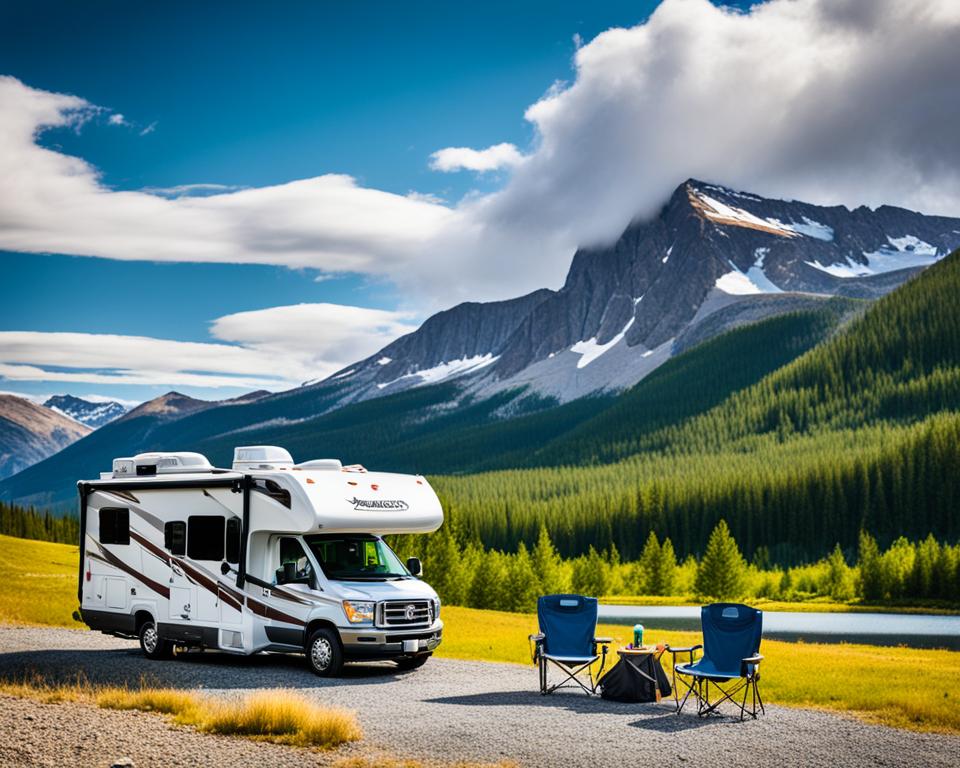RVing can be an exciting and liberating adventure for beginners. However, navigating the world of RVing can be overwhelming, and it’s important to be aware of common mistakes that can turn your dream RV trip into a nightmare. By understanding these pitfalls and taking proactive measures, you can ensure a smoother and more enjoyable RVing experience.
Key Takeaways:
- Choosing the right RV for your needs and budget is crucial to avoid future regrets.
- Booking campgrounds in advance is essential, as popular destinations fill up quickly.
- Connectivity and internet access can be unpredictable, so plan alternative solutions.
- Understanding your RV’s length and campsite requirements can prevent booking mishaps.
- Researching campground amenities and hookups ensures a comfortable stay.
Choosing the Right RV for Your Needs and Budget
One of the first mistakes beginners often make when embarking on their RVing journey is failing to choose the right RV to suit their needs and budget. To ensure a successful and enjoyable experience, it’s crucial to consider several factors, such as the size of the RV, towing capacity, and budget constraints.
Beginners should begin by evaluating their specific needs and preferences. Are they traveling solo or with family? Do they plan to stay in campgrounds or venture off the beaten path? Answering these questions will help determine the right type of RV for their adventure.
Once their needs are identified, beginners should conduct thorough research and compare different RV models and brands. Reading online reviews, watching video tours, and visiting RV dealer websites can provide valuable insights into the features and quality of various RVs.
It’s important to consider the size of the RV carefully. Smaller RVs, such as Class B motorhomes or camper vans, are more maneuverable and suitable for solo travelers or couples seeking simplicity. On the other hand, larger RVs, such as Class A motorhomes or fifth wheels, offer more space, amenities, and storage for families or those planning longer trips.
In addition to size, beginners must also factor in towing capacity. If they plan to tow a trailer or a fifth wheel, the tow vehicle’s capabilities should be thoroughly researched and complied with for safe and efficient travel.
Lastly, beginners should establish a budget for purchasing an RV. Setting a realistic budget will help narrow down the options and prevent overspending. It’s essential to consider not only the initial purchase price but also ongoing costs, such as maintenance, insurance, and campground fees.
By doing diligent research, considering specific needs, and setting a budget, beginners can choose the perfect RV that aligns with their lifestyle and ensures a comfortable and enjoyable RVing journey.
Comparison of RV Types
| Type of RV | Description | Pros | Cons |
|---|---|---|---|
| Class A Motorhome | Luxurious and spacious motorhomes built on a bus chassis with various amenities and features. | Abundant space, luxury features, ample storage | Expensive, challenging to maneuver and park |
| Class B Motorhome/Camper Van | Compact motorhomes or camper vans with basic amenities and facilities. | Maneuverable, good fuel efficiency, suitable for solo travelers or couples | Limited space, fewer amenities and storage options |
| Class C Motorhome | Motorhomes with a distinctive over-the-cab sleeping area, suitable for small families. | Good balance of space and maneuverability, often more affordable than Class A motorhomes | Less space than Class A motorhomes, can be challenging to park |
| Travel Trailer | Towable RVs that offer various sizes and floorplans, require a separate tow vehicle. | Flexible, detachable tow vehicle, more affordable than motorhomes | Requires a tow vehicle, potential sway when towing, limited storage |
| Fifth Wheel | Large towable trailers that require a pickup truck with a specialized hitch. | Spacious, ample storage, ideal for long-term travelers or families | Requires a pickup truck with a compatible hitch, challenging to maneuver |
Choosing the right RV is essential for a successful RVing journey. By considering factors such as size, towing capacity, and budget constraints, beginners can find an RV that perfectly suits their needs and preferences. Thorough research and wise decision-making will ensure an enjoyable and comfortable RVing experience.
Booking Campgrounds in Advance
When it comes to RVing, beginners often make the mistake of not booking campgrounds in advance. Unlike hotels, campgrounds can fill up quickly, especially in popular RVing destinations. To avoid being left without a spot, it’s essential to book early and secure the best availability. By planning ahead, you can ensure a smooth and stress-free camping experience.
Booking campgrounds in advance not only guarantees you a spot, but it also allows you to choose the location and amenities that suit your needs. Whether you prefer a waterfront site, a spot near hiking trails, or a campground with full hookups, securing your reservation ahead of time ensures you get the perfect spot.
Moreover, being aware of campground courtesies is crucial for a pleasant RVing experience. Respect your fellow campers by following noise regulations, keeping your space clean, and adhering to any specific rules set by the campground. Remember, being considerate goes a long way in creating a harmonious camping environment for all.
Before booking a campground, it’s a good idea to read reviews and gather information on the facilities, cleanliness, and overall quality of the site. This will help you make an informed decision and avoid any unpleasant surprises upon arrival.
To give you an idea of the different types of campgrounds and their amenities, here’s a table highlighting some popular RV camping options:
| Campground | Amenities |
|---|---|
| State Parks | Scenic locations, hiking trails, picnic areas, basic facilities |
| Private Campgrounds | Full hookups, WiFi, swimming pools, playgrounds, organized activities |
| National Forest Campgrounds | Rustic settings, beautiful natural surroundings, limited facilities |
| RV Resorts | Top-notch amenities, luxurious surroundings, entertainment options |
Remember, when booking campgrounds, it’s important to consider not only the availability but also the amenities and location that align with your preferences. Taking the time to plan and book in advance gives you peace of mind and ensures an enjoyable RVing adventure.
Connectivity and Internet Access
When embarking on an RVing adventure, one of the essential considerations for newbies is connectivity and internet access. While the allure of being off the grid can be tempting, staying connected with the world can enhance the overall experience. However, it’s important to note that connectivity and internet access can vary greatly from campground to campground.
Many campgrounds claim to offer free WiFi, but the reality is that the quality and reliability may not meet expectations. It’s not uncommon to experience slow speeds, limited bandwidth, or connectivity issues. As a result, relying solely on campground WiFi may not be the best solution for staying connected while RVing.
So, what can newbie RVers do to ensure reliable internet access during their travels? Here are some tips:
- Research Campground Reviews: Before choosing a campground, it’s recommended to check online reviews specifically addressing internet connectivity and signal strength. Fellow RVers often share valuable insights and personal experiences that can give you a better understanding of the internet situation at various campgrounds.
- Consider Cellular Data Plans: Investing in a reliable cellular data plan can provide a more consistent and stable internet connection. While it may incur additional costs, it offers flexibility and convenience since it’s not dependent on campground WiFi availability. Research different carriers and their coverage areas to determine the best option for your RVing needs.
- Use WiFi Boosters and Extenders: WiFi boosters and extenders can help amplify and extend existing WiFi signals, especially in campgrounds with weak or limited coverage. These devices can provide a better WiFi experience within the confines of your RV, ensuring stronger and more reliable connectivity.
Being Proactive for Quality Internet Access
When it comes to connectivity and internet access, proactive planning is key for newbie RVers. By anticipating potential challenges and considering alternative options, you can stay connected and enjoy a seamless online experience while RVing. Keep in mind that even with the best preparations, occasional hiccups may occur, but being ready with backup solutions will help mitigate any inconvenience.
Quote:
“Reliable internet access can make a significant difference during RVing journeys. By being proactive and exploring different options, newbie RVers can ensure they stay connected to the digital world without sacrificing the freedom and adventure of the RVing lifestyle.”
– Jane Miller, Experienced RVer
Recommended Internet Solutions for RVing
| Solution | Description |
|---|---|
| Cellular Data Plan | Invest in a reliable cellular data plan from a reputable carrier for consistent and independent internet access. |
| WiFi Boosters and Extenders | Amplify and extend existing WiFi signals within the RV, enhancing connectivity and range. |
| Satellite Internet | Consider satellite internet services for more remote RVing destinations with limited cellular coverage. |
These solutions are just a few options to explore, and the choice ultimately depends on individual preferences and needs. By understanding the limitations of campground WiFi and proactively seeking alternatives, newbie RVers can enjoy a smooth online experience while exploring the open road.
Knowing RV Length and Campsite Requirements
When it comes to RVing, beginners often overlook a crucial aspect: knowing their RV’s length and understanding campsite requirements. This oversight can lead to frustration, inconvenience, and even potential accidents. To ensure a smooth and stress-free RVing experience, it’s important to pay attention to these details and plan accordingly.
Before making a reservation at a campground, it’s crucial to confirm that the campsite can accommodate the length of your RV. Failure to do so may result in not being able to park your RV or having to make last-minute changes to your plans. To avoid any issues upon arrival, take the following steps:
- Measure your RV’s length accurately: Use a tape measure to determine the exact length of your RV, including any additional attachments such as bike racks or towed vehicles.
- Research campgrounds: Look for campgrounds that explicitly state the maximum length of RVs they can accommodate. Many campground websites provide this information, or you can call ahead to inquire.
- Consider additional requirements: Some campgrounds may have restrictions on other factors such as slide-out extensions, awnings, or tow vehicles. Be sure to inquire about any specific requirements when making your reservation.
By knowing the length of your RV and understanding campsite requirements, you can avoid any potential setbacks and ensure a seamless experience at your chosen campground. Making a quick phone call to confirm the availability of a suitable campsite can save you time, money, and unnecessary stress.
Pro tip: While measuring your RV’s length, it’s a good idea to record its height as well. Knowing the height of your RV will help you avoid low clearance obstacles such as bridges or tunnels along your route.
Take the time to familiarize yourself with the campsite’s check-in and parking procedures, as different campgrounds may have specific guidelines. With adequate preparation, you can ensure that your RVing adventure starts off on the right foot.
Understanding Campground Amenities and Hookups
When it comes to RVing, knowing what amenities and hookups to expect at campgrounds is essential for a comfortable and enjoyable stay. Campground amenities can vary widely, from basic facilities to luxurious offerings. By researching and understanding the amenities available at each campground, beginners can plan accordingly and make the most out of their RVing experience.
One of the key considerations is the type of electrical hookup provided at the campground. Most RVs rely on electricity to power various appliances and systems onboard. Researching the type of electrical hookup available, be it 30-amp or 50-amp, will ensure that the RV is compatible and can operate optimally.
Additionally, it’s crucial to determine if the campground offers water hookups, sewer connections, or dump stations. These facilities are vital for maintaining proper sanitation and convenience during an RV trip. Beginners should check the campground’s website or contact the management to confirm the availability of these amenities.
Knowing the campground’s amenities and hookups in advance allows RVers to pack accordingly and plan for any additional supplies they may need. For example, if the campground doesn’t offer water hookups, they can ensure sufficient water storage or carry additional water containers for refilling.
Furthermore, it’s worth considering the availability of other amenities that can enhance the overall RVing experience. Some campgrounds offer facilities such as swimming pools, playgrounds, picnic areas, laundry facilities, Wi-Fi access, and even recreational activities like hiking trails or fishing ponds. These amenities can vary drastically from one campground to another, and having a clear understanding of what is offered can help RVers choose the campgrounds that align with their preferences and interests.
| Amenities | Availability |
|---|---|
| Electric Hookup (30-amp) | Yes |
| Electric Hookup (50-amp) | Yes |
| Water Hookup | Yes |
| Sewer Connection | Yes |
| Dump Station | Yes |
| Swimming Pool | Yes |
| Playground | Yes |
| Picnic Area | Yes |
| Laundry Facilities | Yes |
| Wi-Fi Access | Yes |
| Recreational Activities | Yes |
By understanding campground amenities and hookups in advance, RVers can make informed decisions and ensure a hassle-free stay at campgrounds. It’s advisable to check campground websites, read reviews, and contact the management for any specific questions or concerns. Being prepared and knowledgeable about the available facilities will contribute to a memorable and enjoyable RVing experience.
Navigating Tail Swing and Parking Challenges
Navigating tail swing and parking challenges can be daunting for beginners. When maneuvering in tight spaces, it’s essential to be aware of the RV’s tail swing, which refers to the pivot motion of the RV’s rear end while making a turn. Failure to understand and account for tail swing can result in accidents, damage to the RV, and potential safety risks.
To avoid tail swing mishaps, beginners should follow these important RVing dos and don’ts:
- Do: Take it slow and approach turns and parking spaces with caution. It’s always better to drive at a slower speed and make gradual, controlled turns to minimize the impact of tail swing.
- Do: Seek assistance from experienced RVers or campground staff if you’re unsure about a maneuver. They can provide guidance and offer valuable tips to help you navigate tricky spots safely.
- Don’t: Assume that all parking spaces, driveways, and roads are suitable for your RV’s size. Always evaluate the clearance, width, and turns at any location before attempting to park or maneuver your RV.
- Don’t: Forget to practice and get comfortable with your RV’s dimensions before hitting the road. Spending time in open areas, such as empty parking lots, can help you gain confidence in handling your RV’s tail swing and maneuvering in different situations.
Remember that patience, practice, and awareness are key when it comes to navigating tail swing and parking challenges. By following these RVing dos and don’ts, beginners can minimize the risk of accidents and ensure a smooth and stress-free RVing experience.
RVing Tail Swing and Parking Tips from Experienced RVers:
“Always give yourself extra clearance when turning or parking your RV. It’s better to be safe than sorry and avoid any potential damage to your vehicle or property.” – Sarah Thompson, experienced RVer
“If you’re unsure about a parking spot, ask for assistance. Most RVers are more than willing to lend a helping hand, share their expertise, and make sure everyone has a great experience on the road.” – Mike Reynolds, seasoned RV traveler
| Common Tail Swing Mistakes | Tips to Avoid |
|---|---|
| Turning too sharply | Make wider turns and be mindful of the rear end swing |
| Underestimating clearance | Check and double-check for any potential obstacles or low-hanging branches |
| Not adjusting for slope | Take into account the slope of the terrain to prevent bottoming out or scraping the RV |
| Overlooking rearview mirror visibility | Use RV-specific mirrors and adjust them properly for enhanced visibility |
By following these tips, new RVers can gain the confidence and skills necessary to navigate tail swing and overcome parking challenges with ease. Remember, practice makes perfect, and soon you’ll be maneuvering your RV like a pro!
Handling RV Repairs and Maintenance
RVs require regular maintenance and repairs, just like any other vehicle or home. It’s important for beginners to budget for these inevitable expenses and to stay proactive in addressing repairs and maintenance tasks. Being prepared and having the necessary resources and knowledge can prevent breakdowns and ensure a smoother RVing experience.
When it comes to RV repairs and maintenance, there are a few key considerations to keep in mind:
- Annual check-ups: Schedule regular annual check-ups for your RV to catch any issues before they become major problems. Find a trusted RV service center or technician who specializes in RV maintenance and can provide a thorough inspection of your vehicle.
- Learn basic maintenance tasks: Familiarize yourself with basic maintenance tasks like checking tire pressure, changing filters, and inspecting seals and caulking. This will help you catch minor issues early on and prevent more serious damage.
- Keep a toolbox: As an RV owner, it’s essential to have a well-stocked toolbox with basic tools and spare parts. This includes items like screwdrivers, pliers, fuses, and electrical tape. Having these supplies on hand will allow you to handle small repairs on your own while on the road.
- Know your warranty: Understand the details of your RV’s warranty and keep track of any expiration dates. This will help you determine what repairs may be covered by the manufacturer and what you’ll need to handle independently.
Remember, prevention is key when it comes to RV maintenance. Regularly inspect your RV for signs of wear and tear, address any issues promptly, and be proactive in taking care of your investment.
“Regular maintenance and proactive repairs are essential to keep your RV in top shape and avoid unexpected breakdowns on the road.”
By following these RVing essentials and incorporating regular maintenance into your RVing routine, you’ll have peace of mind and be ready for any adventures that come your way.
| Common RV Repairs and Maintenance Tasks | Frequency |
|---|---|
| Oil changes and engine servicing | Every 3,000 to 5,000 miles or as recommended by the manufacturer |
| Tire inspections and rotations | At least once every six months |
| Battery maintenance | Annually or as needed |
| Roof inspections and sealant application | Twice a year |
| Appliance inspections and cleaning | As indicated in the manufacturer’s instructions |
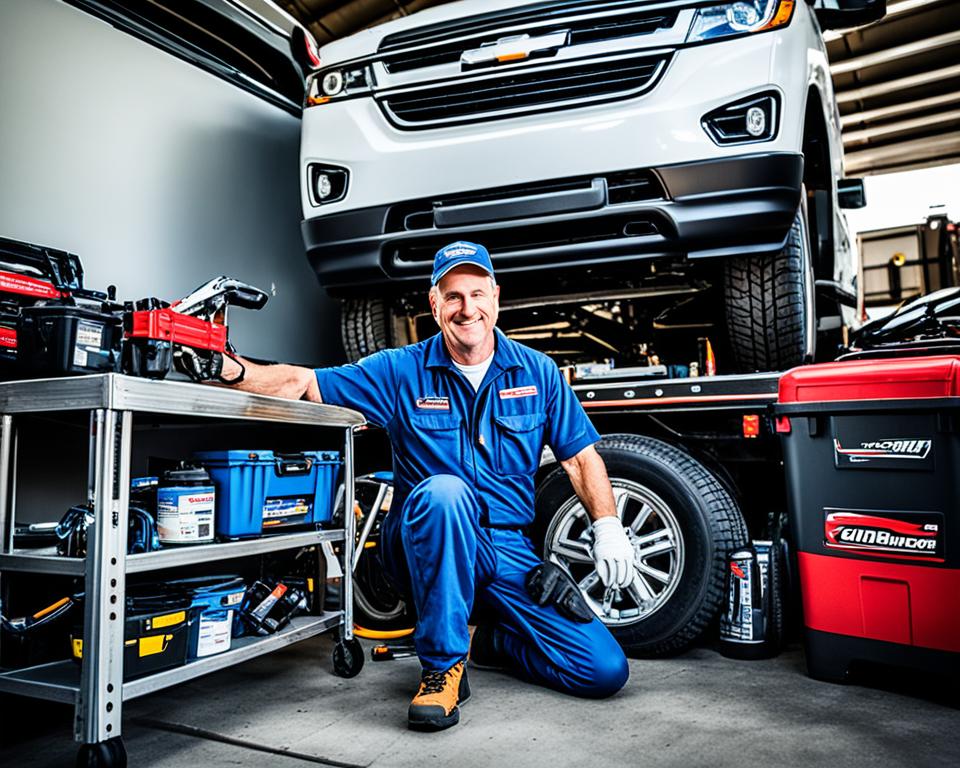
Regular maintenance and proactive repairs are essential to keep your RV in top shape and avoid unexpected breakdowns on the road. By prioritizing these tasks and being prepared, you’ll have a more enjoyable and worry-free RVing experience.
Using RV-Specific GPS and Route Planning
When it comes to navigating your RV, relying on standard GPS or navigation apps may not be the best option. As a beginner RVer, investing in an RV-specific GPS or using apps that provide accurate and RV-friendly routing is highly recommended. By following these RVing tips, you can avoid unnecessary complications and have a smoother journey.
RV-specific GPS devices and apps are designed to cater specifically to the needs of RVers. They take into account the size and weight of your RV, as well as any restrictions or limitations you may encounter on the road. This ensures that the suggested routes are suitable for your RV and helps you avoid low clearance bridges, weight restrictions, and other obstacles that could cause problems.
Planning your routes ahead of time is another essential aspect of using RV-specific GPS and route planning. By mapping out your journey in advance, you can identify potential challenges and make any necessary adjustments. It’s always a good idea to double-check the route for any recent road closures, construction zones, or other factors that could affect your travel plans.
Utilizing RV-specific GPS and route planning not only helps you avoid unexpected obstacles on the road but also contributes to peace of mind. It allows you to focus on enjoying the scenic views and memorable experiences that RVing has to offer.
Remember, when it comes to RVing, preparation is key. So take advantage of the technology available to you and ensure a stress-free and enjoyable RVing experience.
Tips for Using RV-Specific GPS and Route Planning:
- Invest in an RV-specific GPS device or use reputable apps that offer RV-friendly routing.
- Ensure that your chosen GPS or app takes into account the size and weight of your RV.
- Check for any updates or modifications to your intended route to avoid surprises.
- Double-check for low clearance bridges, weight restrictions, and other obstacles that could hinder your RV’s travel.
- Plan your routes in advance to have a clear understanding of your journey.
- Consider alternative routes if needed, taking into account potential road closures or construction zones.
- Stay updated on traffic conditions and make real-time adjustments as necessary.
Using an RV-specific GPS or route planning app can save you time, stress, and potential headaches on the road. Don’t leave it up to chance—let technology be your guide and enjoy a worry-free RVing adventure!
Taking Time to Practice and Familiarize Yourself with Your RV
Skipping a practice run before embarking on full-time RVing is a common mistake for beginners. Taking the time to practice driving, parking, and familiarizing yourself with your RV can build confidence and help avoid careless mistakes. Practicing roles and communication with a partner can also enhance safety and efficiency on the road.
Before hitting the road, it’s essential to practice driving your RV in various scenarios. Find an open area like a parking lot or empty field where you can get a feel for how your RV handles. Pay attention to braking, acceleration, turning, and maneuvering in tight spaces. Practice backing up, parallel parking, and making U-turns to become more comfortable behind the wheel.
Familiarize yourself with the controls and features of your RV. Know where the leveling jacks, awning, and utility hookups are located and how to operate them. Make sure you understand how to access and use all the amenities in your RV, such as the refrigerator, stove, and toilet.
Consider taking a short camping trip close to home as a trial run. This will allow you to test your RV’s systems, practice setting up camp, and troubleshoot any issues that may arise. Use this opportunity to practice parking in different types of campsites, hooking up utilities, and leveling your RV.
When practicing with a partner, establish clear roles and communication protocols. Designate who will be responsible for guiding you during parking maneuvers and communicate through hand signals or two-way radios. Having a well-coordinated system in place can prevent miscommunication and help avoid accidents.
| Practice Tips for Familiarizing Yourself with Your RV: |
|---|
| Find an open area to practice driving, maneuvering, and parking your RV |
| Learn how to operate all the features and amenities in your RV |
| Take a short camping trip close to home to test your RV’s systems |
| Establish clear roles and communication protocols with a partner |
By dedicating time to practice and familiarize yourself with your RV, you’ll gain the confidence and skills needed to navigate the road with ease. Remember, practice makes perfect, and the more comfortable you are with your RV, the more enjoyable your RVing experience will be.
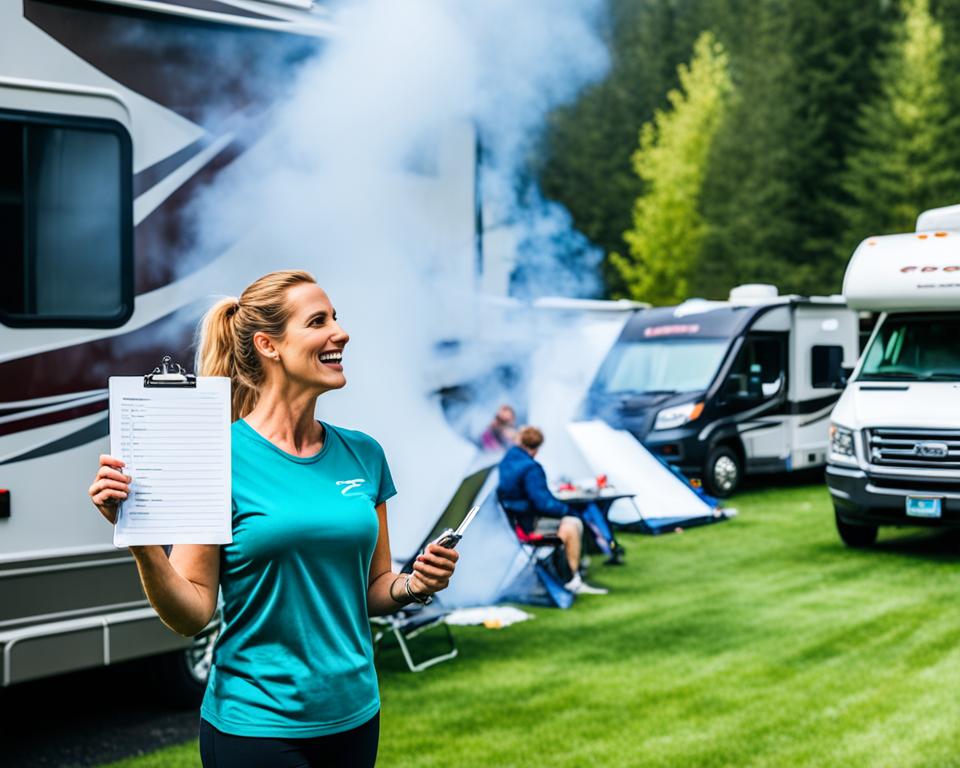
Conclusion
Embarking on an RVing adventure as a beginner may come with its fair share of challenges, but by learning from common mistakes and taking the necessary precautions, new RVers can have a rewarding and enjoyable experience.
When starting out, remember to choose the right RV for your needs and budget. Research the different options available and consider factors such as size, towing capacity, and your financial constraints. Finding the perfect RV that fits your lifestyle will ensure a comfortable and enjoyable journey.
Booking campgrounds in advance is another crucial step for a successful RVing experience. Don’t wait until the last minute to secure your spot. Many campgrounds fill up quickly, especially in popular RVing destinations. By booking early, you can ensure the best availability and have peace of mind throughout your trip.
Additionally, staying connected and prepared for maintenance and repairs is essential. Internet access may vary from campground to campground, so it’s advisable to research and read reviews to ensure reliable connectivity. Budgeting for maintenance and repairs is also important, as RVs require regular upkeep. Taking the time to practice driving, parking, and familiarize yourself with your RV will build confidence and help you avoid careless mistakes on the road.
By following these tips, you can avoid common beginner RVing mistakes and make the most of your RVing journey. Whether you’re exploring national parks, camping by the beach, or embarking on a cross-country adventure, proper planning, and preparation will contribute to a smoother and more enjoyable experience. Happy RVing!
FAQ
What should beginners consider when choosing an RV?
Beginners should consider factors such as the size of the RV, towing capacity, and budget constraints when choosing an RV that fits their needs and budget.
Why is it important to book campgrounds in advance?
Campgrounds can fill up quickly, so booking in advance is important to secure the best availability and avoid disappointment.
What should beginners do about internet access while RVing?
Beginners should be aware that campground WiFi may not always be reliable and should consider alternate solutions for internet access while RVing.
Why is it crucial to know your RV’s length and campsite requirements?
Knowing your RV’s length is important to ensure that the campsite can accommodate it without any issues. Calling ahead to confirm campsite length is advisable.
What should beginners know about campground amenities and hookups?
Beginners should research and understand the amenities offered at each campground and be aware of the type of electrical hookup required for their RV.
How can beginners navigate tail swing and parking challenges?
Beginners should be aware of their RV’s tail swing and take it slow when maneuvering in tight spaces. Seeking assistance from experienced RVers can also be helpful.
What should beginners do to handle RV repairs and maintenance?
Beginners should budget for regular maintenance and repairs and stay proactive in addressing any issues that arise to prevent breakdowns during their RVing journey.
Why is it important to use an RV-specific GPS or route planning app?
Using an RV-specific GPS or route planning app helps beginners avoid low clearance bridges, weight restrictions, and other obstacles that may be problematic for their RV.
Why is it recommended for beginners to practice and familiarize themselves with their RV?
Practicing driving, parking, and familiarizing yourself with your RV builds confidence and helps avoid careless mistakes. Practicing roles and communication with a partner can also enhance safety and efficiency on the road.

